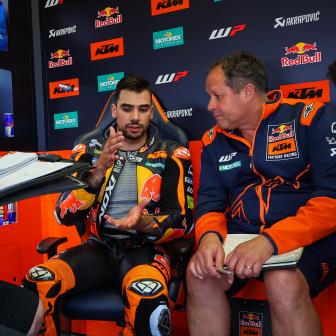That’s quite a lot of control. Is it because there is more pressure now?
FG: A lot of pressure, massively more. More than ten years ago, if you were a factory rider and you had a bad race, you could finish around the top five because the technical gap between the factory and the Independent teams with the bikes and the tyres was much bigger. At the moment, most of the satellite teams are near the same technical level as the factories. It is much more difficult, it is much closer. Last year I made a statistic for five races in a row and the gap between each rider – from 1st to the 12th in Q2 – was 33 milliseconds. So, for us and for the riders it is so difficult to say, “you made a mistake here” or “the bike is not performing here”. The scenario has changed so much in the last five years and everybody has more pressure but the rider the most because they are risking so much.
Mental coaches and sports psychologists have been in the background of MotoGP™ for a number of years but is the psychological aspect of racing the next big area of training to conquer?
FG: It was 2005 actually when I approached a mental trainer and started believing in it more and more. I believed it could help to keep focused and help limit mistakes at this level and this speed. It can save energy for performance and help with clarity for situations and for details. It will be the next [area]. In a lot of sports it is normal. Everywhere you look in sport there is a mix of physical and mental demands. Here a motorcycle rider is seen like a ‘macho’ guy and that type of mental training is not seen as necessary. That’s just ignorance. This sport is always more and more professional. There is no point having the best bike and the best physical shape if you cannot also use your head at this level. So, you should work on it.

